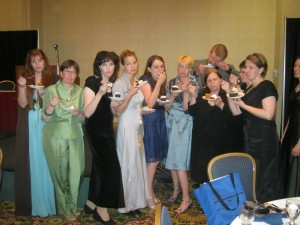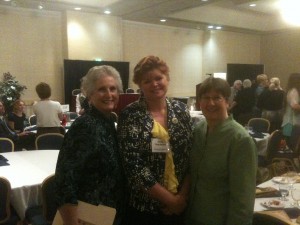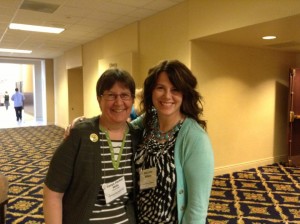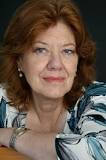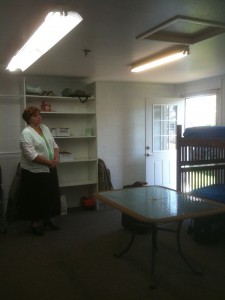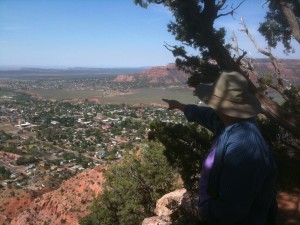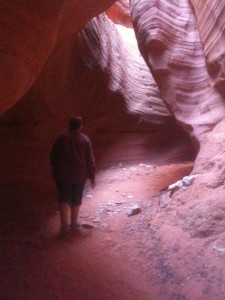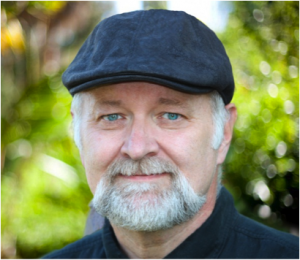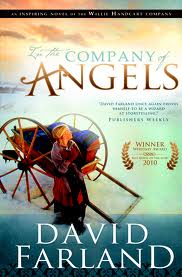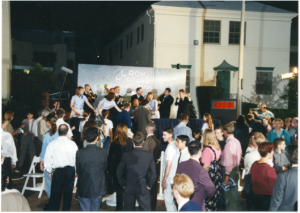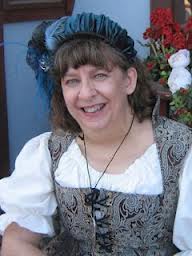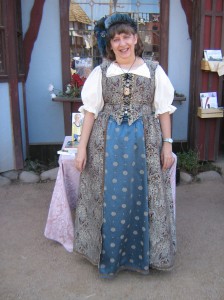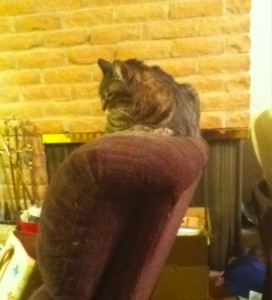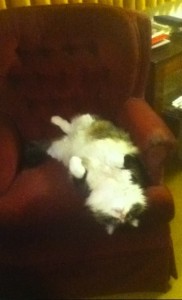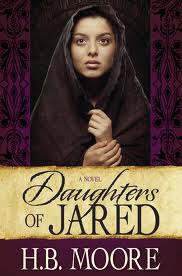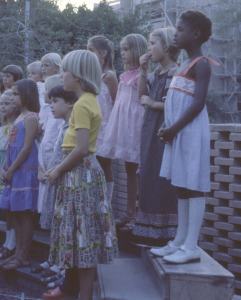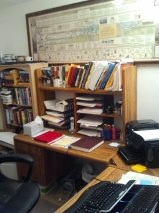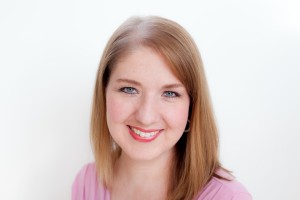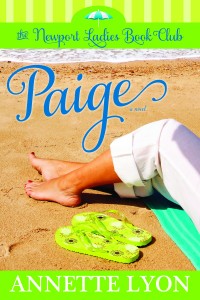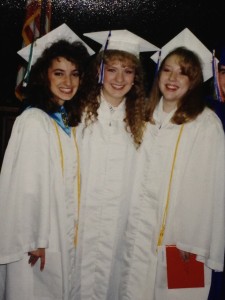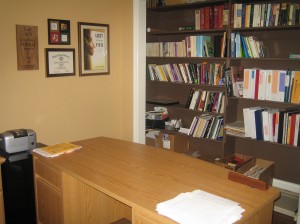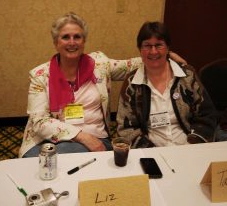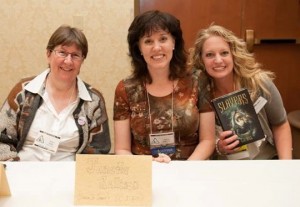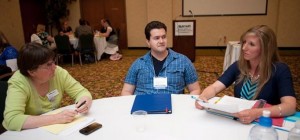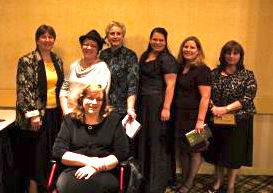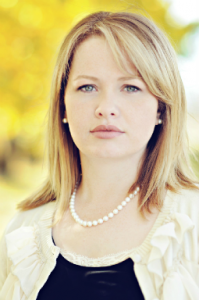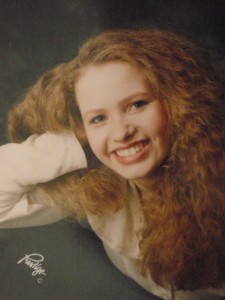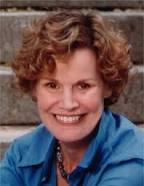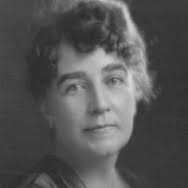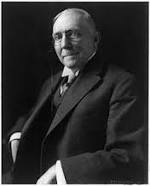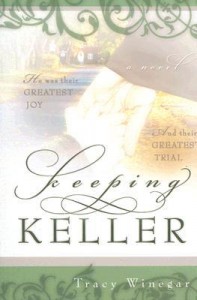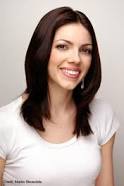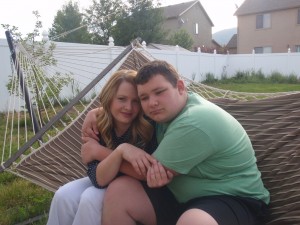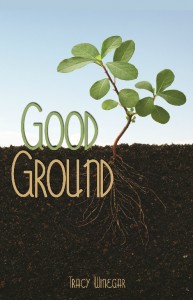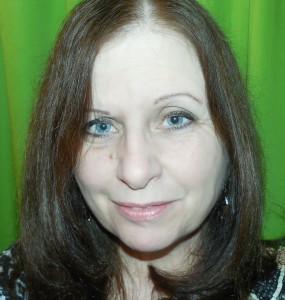I’m interviewing David Farland this week as part of a blog tour featuring his new YA fantasy novel, NIGHTINGALE.
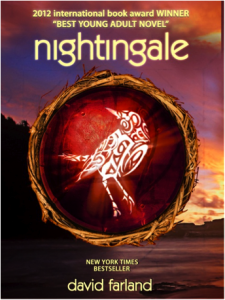
First, a bit about the book and its author:
The multi-award winning novel, NIGHTINGALE, by best-selling author, David Farland, is available in hardback, ebook, and now in a special iPad enhanced version. This young-adult fantasy novel has already been turning heads.
Grand Prize Winner of the Hollywood Book Festival, placed first in all genres, all categories.
Winner of the 2012 International Book Award for Best Young Adult Novel of the Year!
Finalist in the Global Ebook Awards.
Some people sing at night to drive back the darkness. Others sing to summon it. . . .
Bron Jones was abandoned at birth. Thrown into foster care, he was rejected by one family after another, until he met Olivia, a gifted and devoted high-school teacher who recognized him for what he really was–what her people call a “nightingale.”
But Bron isn’t ready to learn the truth. There are secrets that have been hidden from mankind for hundreds of thousands of years, secrets that should remain hidden. Some things are too dangerous to know. Bron’s secret may be the most dangerous of all.
In his remarkable young adult fantasy debut, David Farland shows why critics have called his work “compelling,” “engrossing,” “powerful,” “profound,” and “ultimately life-changing.”
“Superb worldbuilding, strong characters, and Dave’s characteristic excellent prose.” – (Brandon Sanderson, #1 New York Times Bestselling Author)
“A wonderful tale of a young man trying to find his humanity, even though he’s not quite human. One of Farland’s very best!” – (#1 International Bestseller, Kevin J. Anderson)
The enhanced version creates an amazing reading experience complete with illustrations from several talented artists and a sample of a soundtrack that coincides with the story. Published by East India Press, a publishing company that takes e-books in a whole new direction with enhanced multimedia–soundtracks, movie clips, author interviews and more.
Farland has plans for three more books in the series: Dream Assassin, Draghoul, and Shadow Lord.
Now, let’s get to know the author a little better.
Me: Do you recall any details about the first story you ever wrote, or at least the earliest one you can remember?
Dave: Of course. It was called The Island of the Lost Dinosaur. I wrote it when I was five. I even drew a picture of the island and the dinosaur. I think that just about every child will do that. I also think that a disproportionate number of those stories are about lost dinosaurs. In my case, the entire title was inappropriate, since it wasn’t the dinosaur that was lost, but the island. Although, one could maintain that if the island is lost, then the dinosaur is, too. (True.) My mother just couldn’t quite understand my logic on that one.
Here is a picture of the budding author at age five, in his larvael pre-sentient state (Doesn’t that sound just like a science fiction/fantasy writer? :D), shortly before attempting his first story, a literary flop that even a mother couldn’t love.
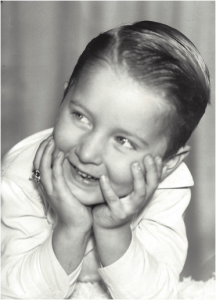 (See those cheekbones? He hasn’t changed a bit.)
(See those cheekbones? He hasn’t changed a bit.)
Me: Where did you grow up and what was it about your childhood that most affected your fiction?
Dave: I grew up in Oregon, in a little town called Monroe, population about 300 (each sign on different ends of the town had varying numbers). We had a nice river that ran near our home, 32 acres of fields and streams, and if you wanted, you could take off hiking up the creek and not cross a road for days as you traveled into forests of Douglas fir. We had lots of wildlife near our farm–deer, pheasants, ducks, cougars, beaver, and so on.
So I fell in love with nature when I was young. If you read my fiction looking for big, beautiful cities, you won’t find them.
(Okay, does anyone else feel like camping now? I do, and I don’t usually like to camp!)
Me: Science fiction, as opposed to fantasy, generally requires a rudimentary understanding of the way the universe works, and it certainly requires a visionary kind of mindset. What kind of background, in terms of both education and books read, gave you the wherewithal to attempt science fiction from the outset?
Dave: As a child, I only read science texts. I ran through all of our local libraries by the time that I was about twelve. I didn’t read fiction at all, until I was forced to at about the age of thirteen.
As a teen, I wrote my first book–a text on the mustiledae family of mammals (weasels, minks, and so on). I followed it that same year with a book on the history of the development of nuclear weaponry in the United States. I also studied oceanography and forestry. That naturally led to a love for the biological sciences, including medicine, and most of my stories revolve around ideas that deal with biology in one way or another.
The first science fiction novel that I read felt rather like an Aesop’s fable–a little heavy on the moralization. From it, though, I recognized that fiction could have some intellectual value, and I began to read a little of it. I didn’t really learn to love science fiction, though, until I read Dune. (Hear, hear!) Between that, Star Wars and a few other choice novels, I began really getting interested in science fiction.
But as I said, when I was young, I loved science. Once, when I was a child of about eight or nine, a neighbor asked, “What do you want to be when you grow up?”
I knew that our genome designated what kind of organism we would be, and I knew that I loved paleontology, so I said, “I want to be a paleo . . . genetic . . . engineer!”
(Talk about precocious!)
“Oh,” she said, “those are very big words. And what do those people do?”
“Build dinosaurs,” I told her. “Of course we can’t do it now, but someday we will.” (You see? He had that visionary thing going even then.)
So I went to college initially and majored in premedical microbiology, with an eye toward research in genetic engineering.
But I kept finding that I wanted to write, and paint. I imagined that I would be a doctor who wrote on the side. Then one day I realized that the desire to write was too strong–so I decided to be a writer who doctored on the side.
Me: Which is harder? Science fiction or fantasy?
Dave: They’re the same. Let me put it this way: you learn to write best what you love best. If you love both equally, you’ll write both with the same enthusiasm.
Never convince yourself that writing in an unfamiliar genre is easy. A couple of years ago, I thought that I would “dash off” a historical novel in a few weeks. After all, since it was based on historical accounts, it would be easy, right? That book, In the Company of Angels, was the hardest thing I’ve ever written. (And it’s great! You can take my word for it.) I won an award for it (Whitney Award: Best Novel of the Year), and it did well in sales, but it taught me a lesson. Writing anything well is hard work.
Me: Where did you set the Guinness Record for the world’s largest book signing and for what book? And how surprised were you at the turnout? (If you happen to have a picture from that event, I’d love to post it.)
Dave: I wrote a comic science fiction novel called A Very Strange Trip back in 1999. It was based on a screenplay by L. Ron Hubbard, and involved a moonshiner from West Virginia who has to carry a time machine across the country. The problem is, every time his truck hits a bump, the machine goes off. On his first stop, he goes back in time and meets up with a beautiful Cherokee squaw, and they keep moving further back with each trip.
Since my grandfather was a moonshiner from West Virginia, and since my grandmother was Cherokee, and since I loved paleontology, I thought it would be a hoot write. (And it sounds like a hoot to read, too.)
In any case, my publisher held a huge party down in Hollywood, with movie stars, a band, and free root beer floats. There are a lot of Scientologists in the area, so I wasn’t at all surprised that we drew a nice crowd.
I’m thinking that next time, we’ll just use beer in the floats. That will bring in the crowds!
(Dave is the little bald guy in the center, slaving under the hot lights while thousands line up for the book signing on July 3, 1999. Note: His description, not mine. If you click on the picture, you can see a slightly larger version and make out Dave in the middle.)
Me: Do you have plans to try any more historical fiction like IN THE COMPANY OF ANGELS?
Dave: I don’t know. I’m fascinated by history, and I think I’d like to write another. I have an ancestor, a German boy of 12 named George Johann Wunderlicht, who was sold into slavery back in the 1700s. I’ve often thought that his family saga was worth a novel. George worked for a ship’s captain, and there is speculation that the captain became a privateer for a while, and then went to Africa to transport slaves. Though, as a Quaker, George was committed to a life of nonviolence, it’s said that he went to battle in the Civil War, even though he was in his 80s, and got shot something like three days after enlistment. So he died to help put an end to slavery. (You’re right. That would make for a fascinating story.)
I’ve often felt that a book about his life would be a great memorial, but there’s so little that I know, it would have to be more fiction than fact. (And, speaking for readers, I think we’d be okay with that.)
Me: Tell us about your new publishing company and your current novel, NIGHTINGALE.
Dave: East India Press is a company that I started with Miles Romney, a cousin to Mitt Romney. We hope to publish novels in multiple formats: as hardcovers, audiobooks, e-books, and most importantly as enhanced novels.
So we’ve put out NIGHTINGALE in each of those formats. Back in 1989, I was hired by IBM to work for a think-tank that would develop novels for reading on the computer. We were too far ahead of our time.
But I’ve been thinking about the possibilities for decades, and with NIGHTINGALE, we wanted to make it an experience. With the enhanced novel, we combined graphics, text, animations, and our own soundtrack with a few other features–such as author interviews.
I think that we’re closing in on what I’d like, but it can be so much better. For example, our soundtrack is really great, but it deserves to be heard in high-fidelity, and most people who read it aren’t going to bother putting on headphones when they’re reading from their iPad.
Still, I think that we created a much more immersive experience for the book.
In any case, NIGHTINGALE is a young adult novel about a young man, Bron Jones, who is abandoned at birth. He’s raised in foster care and kicked from home to home because his families find him to be “too strange.” Finally, at the age of sixteen, he meets a teacher who recognizes that he’s not even human. He’s what she calls a “nightingale,” a member of an ancient species that only looks human.
So Bron begins a remarkable journey to discover where he came from, what he is, and who he is.
(Excuse me a moment while I go order something on my iPad.)
The novel has won four awards so far this year, including the Hollywood Book Festival for Best Book of the Year, and the International Book Award for Best Young Adult Novel of the Year.
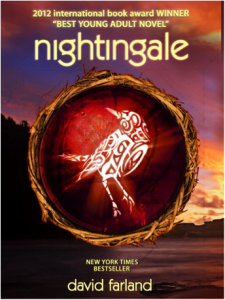 (I thought I’d post the cover again in case you’ve forgotten what it looks like.)
(I thought I’d post the cover again in case you’ve forgotten what it looks like.)
Me: What prompted this particular story? Did this book start with a dream like your first work, On My Way to Paradise, or was it something else?
Dave: Something else. When I was young, I was well aware that humans and Neanderthals had existed together for hundreds of thousands of years before the Neanderthals became extinct. I used to imagine how cool it would be if we found a tribe of them living in Siberia or the mountains of Tibet.
So that was one idea for a novel. But of course we know now that even a hundred thousand years ago, there were at least four humanoid species living together, and I’ve wondered about some of our lesser-known cousins.
Then there is a strange thing in the New Testament. It tells us that “Wise Men” came to visit Jesus at his birth and that they showered gifts on him. The word used for “wise men” or “wizards” (chakam) probably denoted a caste of court magicians similar to the ones that Moses battled with in Pharaoh’s Court. Most likely, these wise men came searching for the new “King of the Jews” because they were looking for jobs. (Okay, I’ll have to admit I haven’t heard that assumption before. Interesting.)
In any case, one day I got to fantasizing about what they might be. Could it be that they were something more than astrologers and soothsayers? Could they be something outside of humanity, creatures with real super intelligence? And so the ideas for NIGHTINGALE were born.
A couple of years later, I was talking to one of my writing students about how to approach a contemporary fantasy, and realized that I really did want to put this one on the front burner. But I had so many novels to write for the Runelords series, I had to put it on the back. The student–Stephenie Meyer–went on to do well, and I kept thinking, “I really need to get that novel out.” It’s taken a while.
Me: I have a thing for writer’s spaces or work areas. How would you describe yours and could you provide a picture?
Dave: My top-secret writing space (Oh, well . . . I guess that means no picture) is an over-stuffed recliner that we keep in a quiet corner of our master bedroom. My advice to writers is: make yourself as comfortable as possible. It makes it easy to write for 14 hours a day if you’re comfortable. So avoid dirty, cramped, uncomfortable, unhealthy, and nasty spaces. Also avoid places with evil vibes, war zones, or places cursed by ancient shamans. (Gotcha! And my office is in my master bedroom, too. Now I just need to talk to my husband about a nice, comfy recliner. :D)
I sometimes go to write in Mexico. I like to greet the dawn on the beach down in Baja, sitting out while the sun rises in shades of pink over the sand. (Hmmm…something else to discuss with my husband.)
Me: Finally, how on earth do you manage to produce “David Farland’s Daily Kick in the Pants” every day and STILL have time for your own writing?
Dave: I did it every day, mostly, for the first couple of years. Now I only write the advice column a couple of times a week. Originally, I thought that the column might run for a year or so, and that I would use the ideas for my book on writing. That hasn’t worked out very well. My book, Storytelling as a Fine Art, could probably be finished in a month if I pulled all of my material together. Right now, I have thousands of pages of Daily Kicks.
But the truth is, I enjoy writing the articles, and every so often I look at my ideas for new articles and realize that there is just more that needs to be said.
Well, as you’ve read here, Dave is a veritable fountain of knowledge and I love that he’s so good about sharing all he knows, whether it’s here on blogs like mine or at writers conferences like the one put on each spring by LDStorymakers, or at his own Writer’s Death Camp (which I am bound and determined to attend next year). If the Death Camp isn’t your style, he offers plenty of other workshops, as well.
Besides buying his latest book, I urge you to check out his website where you, too, can sign up to receive his Daily Kick!
Originally posted 2012-10-24 06:00:11.
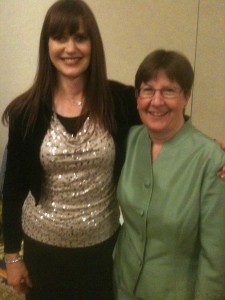 And here I am with my editor, Linda Prince
And here I am with my editor, Linda Prince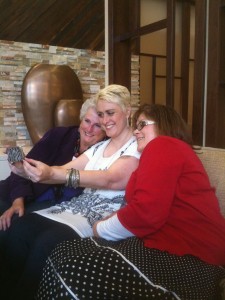 The 3 “L”adies — Liz Adair, Linda Adams, and Laurie Lewis
The 3 “L”adies — Liz Adair, Linda Adams, and Laurie Lewis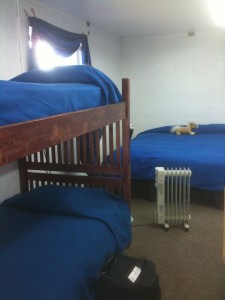 The bunkhouse sleeps 8 — here’s one half
The bunkhouse sleeps 8 — here’s one half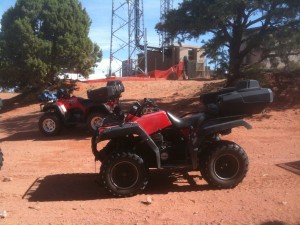 The ATV I rode up to the top of Antennae Mountain
The ATV I rode up to the top of Antennae Mountain
